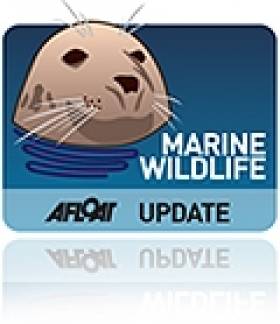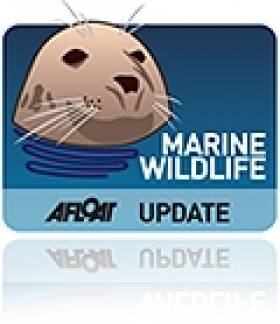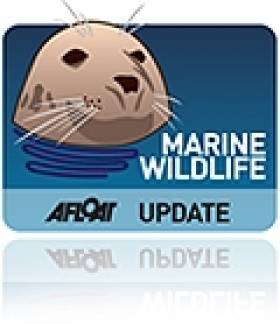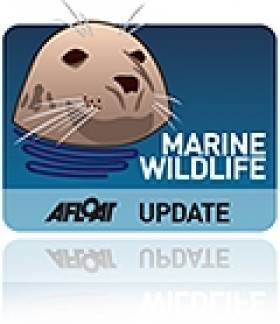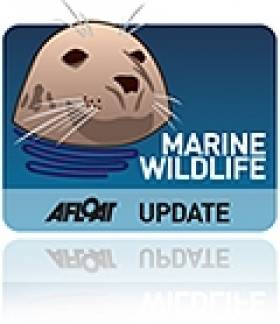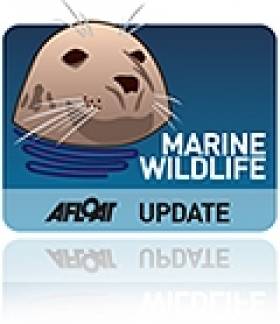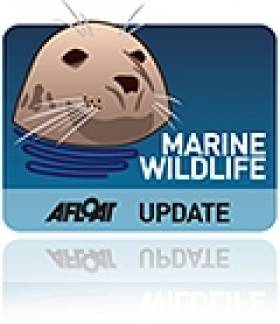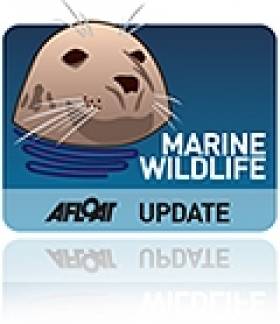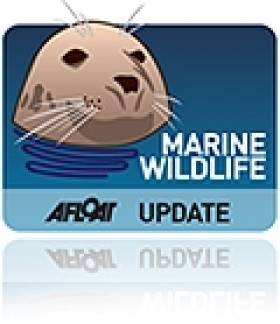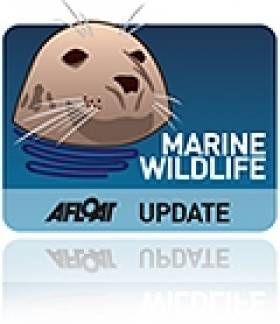Displaying items by tag: Dolphins
Doolin's Dolphin Dusty 'More Jumpy' Than She Used To Be
#Dusty - Renewed warnings have been made to the public to keep a wide berth from Doolin's dolphin Dusty as the Irish Examiner reports she's "more jumpy" than usual.
Last summer the female bottlenose earned a degree of infamy after attacking a number of bathers in the Co Clare town, one of whom suffered eight spinal fractures, two broken ribs and lung damage in their altercation.
As we get closer to this year's summer, it may be tempting to join Dusty in the water for typical dolphin frolics, but Vanessa Fagan-Vanhorn of Dolphin Day Ireland strongly advises against it.
“[Disty] is definitely more jumpy and easier to startle than she used to be," she says. "The incidents of last summer do seem to have had an effect and her behaviour has changed."
The Irish Examiner has more on the story HERE.
Frolicking Dolphin Pup Great Sign For Upcoming Celtic Mist Trip
#Dolphins - Marine photographer Myles Carroll snapped some beautiful shots of a dolphin pup frolicking in the waves off Hook Head last weekend, as TheJournal.ie reports.
The baby was just one of a near 40-strong dolphin pod sighted off the Wexford coast in recent days, just in time for the Irish Whale and Dolphin Group's latest cetacean spotting trip this weekend on board the Celtic Mist.
For details contact the IWDG at [email protected].
America's Dolphin Death Toll Show No Signs Of Abating
#MarineWildlife - The dolphin death toll on America's Atlantic coast caused by a measels-like virus now exceeds 1,000 - and marine scientists have warned the Guardian that the epidemic shows now signs of slowing down.
As reported in August on Afloat.ie, more than 300 deaths of bottlenose dolphins found between New York and North Carolina - more than 10 times the average for the time of year - were connected with the presence of morbillivirus.
Researchers speculate that the marine mammals have somehow lost their natural immunity to the disease, which first appeared in the late 1980s when it killed a known 740 cetaceans - but factors due to climate change have also not been ruled out.
The previous outbreak of morbillivirus wiped out half of all of the Eastern Seaboard's coastal migratory dolphins, whose population currently stands at more than 39,000 thanks to conservation efforts since that last epidemic.
It's not believed there is any connection between the morbillivirus resurgence on the far side of the Atlantic and the continued rise in dolphin strandings around Ireland.
However, the Irish Whale and Dolphin Group (IWDG) has identified a different threat to Irish cetaceans, calling for a ban on pelagic fishing within Special Areas of Conservation in West Cork and the Shannon Estuary in order to preserve a key food source for local dolphins and porpoise.
"The removal of herring and sprat could have a significant impact on [cetaceans'] foraging efficiency and hence on the life histories of harbour porpoise and bottlenose dolphins, especially their reproductive fitness," says the IWDG's Dr Simon Berrow.
Boy's Santa Wish To See Dolphins Set To Come True
#MarineWildlife - The Irish Mirror says it's played a helping hand in granting a young boy's biggest Christmas wish after a marine conservation group reached out to his heartbreaking plea to swim with dolphins.
Conservation group Sea Shepherd read the 12-year-old's letter to Santa that was published in the Mirror earlier this week, in which he told of his abusive childhood and his "lifelong dream" to see Winter the dolphin in Florida.
While Sea Shepherd is not able to fly the boy to Florida, they have offered to take him to see dolphins in their natural habitat off West Cork and show him "that inspiration can come from the wild dolphins around our coast," according to the campaign group's Irish director Sue Anthony.
The Irish Mirror has more on the story HERE.
Dolphin Diners Signal Intense Marine Mammal Activity
#MarineWildlife - The Irish Times has posted exclusive video of a dolphin pod enjoying the feeding bounty off Baltimore this week - just a sample of the intense marine wildlife activity around Ireland's coasts in recent days.
Pádraig Whooley of the Irish Whale and Dolphin Group (IWDG) told the IT that the current band of high pressure over Ireland "is making it much easier for us to spot them" as they stream to our shores along with various whale species to feed on migrating herring shoals.
But it hasn't been all good news, as the IWDG writes of a mass stranding of up to 13 common dolphins - mostly mother-and-calf pairs - on the Mullet Peninsula in Co Mayo last Sunday 24 November.
Those that were not able to refloat themselves were helped back into deeper water by locals. But a dead adult female was still found at Elly Bay the following day, with its calf in the water nearby - followed later by another stranded adult female and calf who had to be euthanised.
And the day after two more adult female and a male calf were found dead on the beach, while two more adults and calf were refloated and subsequently beached again.
IWDG records show 34 reports of live strandings on the Mayo coast, 17 alone on the Mullet Peninsula.
Dolphin Swim An Unforgettable Experience For NI Kids
#DolphinSwim - Two children with disabilities from Northern Ireland recently enjoyed the trip of a lifetime to Florida where they got to swim with some friendly dolphins.
As the News Letter reports, 14-year-olds Ryan Shannon from Belfast and Michael Bowes from CO Tyrone became firm friends on the trip, organised by charity Dreamflight for youngsters with disabilities seriously ill children.
Their busy week of activities, which included visits to Walt Disney World and Universal Studios, included a 30-minute swim with dolphins at Discovery Cove in Orlando's SeaWorld marine wildlife park - a clip of which you can see above (c/o the Belfast Telegraph).
Irish Sea A 'Breeding Ground' For Dolphins Say Manx Researchers
#MarineWildlife - Five Risso's dolphin calves spotted by researchers off the Isle of Man this summer point to the waters of the Irish Sea as a breeding ground for the gregarious marine mammals.
As BBC News reports, the five calves were seen north of the Calf of Man at the end of July.
And according to a spokesperson for the Manx Whale and Dolphin Watch: "It means Manx waters must be important to the breeding population of Risso's dolphins in the Irish Sea."
The waters between the east coast of Ireland and north-west England and Wales are known to be teeming with dolphins of different species, with video of a dolphin 'superpod' wowing ferry-goers earlier this year.
BBC News has more on the story HERE.
Dolphins Decimated By Disease On America's Atlantic Coast
#DolphinDeaths - Hundreds of bottlenose dolphins have died in strandings along the east coast of the United States this summer - and a measles-like virus could be to blame.
As The Irish Times reports, the National Oceanic and Atmospheric Administration (NOAA) is currently investigating the extraordinary die-off, which has been tentatively connected to morbillivirus, an immune system suppressor similar to the virus that causes human measles.
In numbers not seen since the late 1980s, as many as 333 dolphin carcasses have been found on the shoreline between New York and North Carolina, more than 10 times the average for this time of year.
Researchers from universities and marine institutes are concentrating on the Virginia coastline, where the majority of the dead cetaceans have been found, and believe they have identified evidence of morbillivirus in nearly all sampled carcasses.
Wired Science says scientists do not yet know what caused the outbreak, though they speculate that dolphins may simply have lost their natural immunity to the virus since the last attack.
And according to the NOAA's Teri Rowles: “At this point, there isn’t anything to stop the virus.”
As of yet there are no indications if the virus could migrate to dolphin populations on this side of the Atlantic, particularly in the designated cetacean sanctuary of Irish waters.
Wired Science has much more on the story HERE.
#MarineWildlife - A humpback whale new to Irish waters has been confirmed by the Irish Whale and Dolphin Group (IWDG).
Photos of the humpback's fluke and dorsal fin captured by Nick Massett off Clogher and Sybil Heads in West Kerry at the weekend were examined by the IWDG's catalogue experts who have determined that the whale is a new arrival - and one with a fluke colouring that's rarely seen in Irish waters.
Details have since been sent to Allied Whale in the US state of Maine - which curates the North Atlantic humpback whale catalogue - to see if a match can be made among its database of more than 7,000 fluke images.
Meanwhile, Wildlife Extra reports that sailors in the Irish Sea are urged to keep a lookout for a large group of minke whales.
The group includes three juveniles and a calf previously spotted some 19 miles east of Ireland's Eye near Howth.
"Although sightings of Minke whale are to be expected in these waters, such a large group is a rare occurrence," said Danielle Gibas, sightings officer with the UK's Sea Watch Foundation, which is organising Britain's annual National Whale and Dolphin Watch this week till 3 August.
And in other cetacean news, scientists claim that dolphins call each other by name, calling back to the sound of their signature whistle but ignoring whistles that aren't theirs.
Herald.ie reports on the findings by marine scientists at the University of St Andrews, who studied a bottlenose dolphin group off the east coast of Scotland.
Using underwater speakers, they played synthesised versions of dolphin whistles they'd identified with particular dolphins to determine their reactions.
They were surprised to find that individuals called back after hearing their own 'name' but ignored others, whether they were for dolphins in the same group or strangers.
New Research Says Sonar Sends Whales Scurrying
#MarineWildlife - The Guardian reports on new research which proves that military sonar has a direct effect on the behaviour of whales in our oceans - even leading to mass strandings.
The studies, part funded by the US Navy, found that beaked whales where particularly sensitive to sonar - and that even blue whales, the largest animals on earth, were distracted from feeding by the subsurface noise.
It's long been feared that the use of sonar is to blame for unusual behaviour among whales, who navigate and communicate with each other over long distances using sound.
As previously reported on Afloat.ie, the Irish Whale and Dolphin Group (IWDG) identified sonar activity by Royal Navy submarines as a possible cause of a the mass stranding of pilot whales in Donegal in November 2010, in which as many as 35 whales died.
Now for the first time, sonar has been proven to affect behaviour of cetaceans to a detrimental degree, confirming for many a connection between the use of sonar technology and recordings of whale and dolphin strandings identified since the 1950s. The Guardian has much more on the story HERE.
In more positive whale-related news, the IWDG reports that its next Cape Clear summer whalewatching course over the weekend of 26-28 July is "filling up nicely".
Places are still available but as it coincides with the tourism high season in West Cork, anyone interested is advised to book sooner than later to ensure they have someone to stay nearby.
The most recent weekend course over the June bank holiday witnessed numerous harbour porpoises and common dolphins, but its hoped the elusive whales will make an appearance next time round!



























